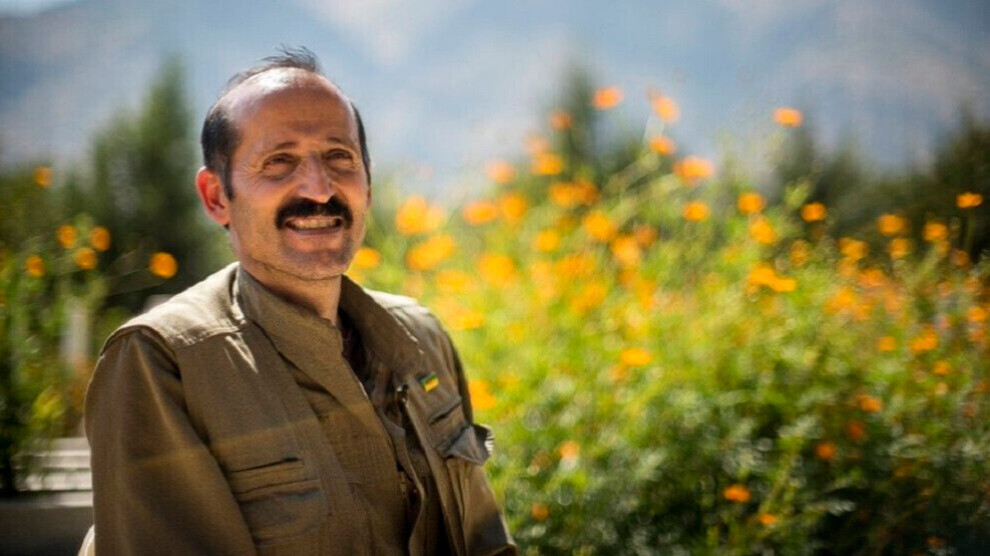Internationalist Commune of Rojava pays tribute to martyr Kasim Engîn
The Internationalist Commune of Rojava paid tribute to martyr Kasim Engîn (Ismail Nazlikul).
The Internationalist Commune of Rojava paid tribute to martyr Kasim Engîn (Ismail Nazlikul).

The Internationalist Commune of Rojava paid tribute to martyr Kasim Engîn (Ismail Nazlikul), a socialist, historian and guerrilla commander. He was martyred as a result of an air attack on the guerrilla areas in the region of Bradost, South Kurdistan, on 27 May 2020.
The Internationalist Commune said that martyr Kasim Engîn "played an important role in making the freedom struggle in Kurdistan known globally, spreading the paradigm of Democratic Modernity and, with that, creating a new Internationalism. At the same time, his struggle against assimilation and alienation became an example for all youth who are forced to live outside their homeland – not only Kurds. For him, a struggle for socialism had to be fought on all layers – political, cultural, military, ideological."
Who is Şehîd Kasim Engîn?
The Internationalist Commune wrote: "His family is from Bazarcix, a mountainous region in North-West Kurdistan under Turkish occupation. As this region has been very resistant throughout history, it was targeted by the Ottoman Empire and later by the Turkish “Republic” with various forms of genocide, the most famous of which is the Maraş massacre in 1978.
His family had been in contact with the PKK since its foundation in 1978; one of his uncles was martyred in the early years of the struggle. Since 1985, Şehîd Kasim Engîn has actively participated in the works of the freedom movement in Europe, and in 1989 he decided to join the ranks of the PKK as a professional revolutionary. Life outside his home-country brought him to contradictions at a young age. He later studied in detail the effects of the policy of forced migration on the Kurdish people, especially the youth."
The Internationalist Commune continued: "Within the framework of the revolutionary work, he organized the Kurdish population in the diaspora and took on great responsibilities, especially in youth, cultural and diplomatic works. In Germany, he also played a major role in the production and distribution of the Kurdistan Report, thus making a major contribution to publicizing the freedom struggle and the emergence of the solidarity movement.
To better understand the reality of the Kurdish people, Şehîd Kasim went to the Mahsum Korkmaz Academy in Lebanon in 1990. There he also met Abdullah Öcalan and studied the history of Kurdistan, the philosophy and the values of the Freedom Movement in depth. While his time at the Academy, he was translating for Abdullah Öcalan in meetings with journalists, allies and all kind of people that came to visit the visionary of the Kurdish Freedom Movement."
The Internationalist Commune added: "He then became a guerrilla commander and fought in almost all parts of Kurdistan. As he grew up outside his home country, he could not speak Kurdish when he came to Kurdistan. Being convinced that to know one’s own language is one of the most important steps to fight the assimilation and alienation enforced by colonialism, he was later able to speak the dialects of all the regions that he fought in. With this ability, he also became one with the people of all the regions he lived in.
Later he would contribute especially to media and ideological work inside the movement. His book “History is now” is one of the deepest interpretations of the history of Kurdistan from a revolutionary perspective and became a basis for all kinds of education. When he became a martyr, he was a member of the PKK Central Committee.
For all internationalists that are organizing themselves under the paradigm of Democratic Modernity Kasim Engîn became an inspiration for their struggle and is being remembered for his love for all fighting people and his eagerness to bring them together for a united struggle."